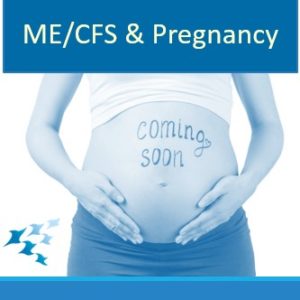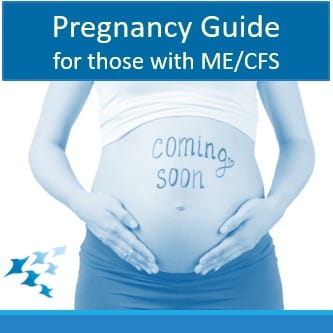 ME/CFS presents additional complexities when making decisions about childbearing. There are options for building a strong network of support to manage pregnancy and help cope with the challenges of parenting with ME/CFS. We hope the following information can help.
ME/CFS presents additional complexities when making decisions about childbearing. There are options for building a strong network of support to manage pregnancy and help cope with the challenges of parenting with ME/CFS. We hope the following information can help.
Pregnancy and ME/CFS
By Peggy Rosati Allen, MS, CNM, WHNP
Assistant Professor, Clinical
University of Utah College of Nursing
Decision-making about childbearing involves complex considerations for many individuals and couples, all the more so if the prospective mother has ME/CFS (Myalgic Encephalomyelitis/Chronic Fatigue Syndrome).
Although there is little scientific information about the relationship between ME/CFS and childbearing, a thoughtful decision about whether or not to become pregnant can be made by examining your life circumstances – your hopes and dreams as an individual or couple; potential limits of ME/CFS for you as an individual or family, and options you have for building a strong network of support to help cope with the challenges of parenting. It may be helpful to keep in mind, as with other aspects of living with the unpredictable nature of ME/CFS, that you can oftentimes fulfill your dreams and goals with some adaptations and careful planning.
We hope you find the following information helpful whether you are deliberating about becoming pregnant, or anticipate pregnancy and childbirth at some point in your future.
What Research and Expert Opinion Tells Us
- Women with ME/CFS may be more likely to have gyn conditions that can decrease fertility; for example, polycystic ovarian syndrome (PCOS) and endometriosis. Treatment is available for both conditions.
- ME/CFS symptoms should either improve or remain unchanged during pregnancy for most women with ME/CFS.
- The need for ME/CFS treatment during pregnancy should be lessened or similar to before pregnancy.
- Early pregnancy nausea and vomiting can be especially severe in women with ME/CFS, requiring medication to treat.
- Research is unclear about whether or not women with ME/CFS have a higher rate of early pregnancy miscarriages.
- Studies show that women with ME/CFS do not have a higher rate of serious pregnancy complications like preeclampsia, diabetes during pregnancy (gestational diabetes), preterm labor or low birth weight babies.
- There is no current evidence that ME/CFS can be transmitted to the fetus despite scientific evidence that the likelihood to develop the illness can be genetically acquired.
- The question about whether or not a mother with viral induced ME/CFS can pass the virus to her baby through breast milk has been raised by one ME/CFS expert, but there are no studies that examine this.
- There is some suggestion in the literature that low cortisol levels in mothers with ME/CFS may increase the risk of developmental delays in their offspring, but this has not been examined through research.
Resource: https://emerge.org.au/about-mecfs/diagnosis/managing-symptoms-daily-basis/pregnancy-motherhood-mecfs/#.V2yku-mQeX0
Preparation for Pregnancy
- Talk with your ME/CFS specialist and women’s health care provider about your plans for pregnancy before you become pregnant. Be prepared for the potential need to stop certain medications.
– Medications commonly used for ME/CFS to treat sleep disturbances, memory, cognition, pain, and mood may or may not be continued during pregnancy and breastfeeding and should be addressed on a case-by-case basis with consideration of risks and benefits.
– Resource: www.mothertobaby.org (801) 328-2229
– A service of the non-profit Organization of Teratology Information Specialists, dedicated to providing evidence-based information to mothers, health care professionals, and the general public about medications and other exposures during pregnancy and while breastfeeding.
- Choose a health care provider for your pregnancy whose values and practices are compatible with your own, and who is at least open to learning about ME/CFS. High quality, compassionate health care will decrease stress during your pregnancy, and help you to have the kind of pregnancy care and birth experience that will be most meaningful and satisfying to you…and may help decrease the chance of ME/CFS relapse related to childbearing.
– Resources: https://www.lamaze.org/QuestionsToAsk
– Additionally, consider asking your prospective obstetric provider if s/he has taken care of women with ME/CFS during pregnancy, what is the extent of his/her knowledge about the illness, &/or is s/he willing to learn more.
Other Pregnancy Considerations
- To limit energy expenditure, enlist support of partner and other family/friends/neighbors for household responsibilities, childcare, and if applicable, maybe even decrease employment commitment during pregnancy.
- Knowledge is empowering. Learn as much as you can about pregnancy, childbirth, and parenting through whatever means are practical for you- e.g. by listening to other women with positive birth stories, reading, and attending prenatal classes.
One on-line option for childbirth preparation: lamaze.org/ParentOnlineEducation - Consider hiring a birth and/or postpartum doula, especially if other sources of support are limited for you. Some organizations offer a sliding fee scale, or the support of a doula in training for a significantly reduced fee.
– A birth doula offers education about the birth process, and emotional and physical support during labor for the expectant mother and her partner
– A postpartum doula offers education, companionship and nonjudgmental support after baby’s arrival. The doula is trained to assist with newborn care, family adjustment, meal preparation and light housekeeping
www.dona.org/mothers/ https://utahdoulas.org/ - Consider taking a prenatal yoga class. Relaxation and breathing techniques are helpful for coping in labor and in decreasing ME/CFS symptoms.
Labor and Birth
Come up with a plan of care in concert with your ME/CFS specialist and OB provider that will minimize likelihood of ME/CFS relapse after giving birth. Some ideas follow:
- Maintain hydration with vigorous intravenous fluid once admitted in labor.
- Talk with your ME/CFS specialist and OB provider about the option of receiving “stress dose” steroid medication (IV hydrocortisone) in labor and immediately postpartum. This intervention is considered an experimental but safe and reasonable option to decrease the possibility of ME/CFS relapse from the physiologic stress of childbirth.
- Other considerations for labor: balance walking and frequent position changes with rest; use caution with prolonged showers or Jacuzzi if you’ve had orthostatic intolerance; if considering water birth (not a good idea if you have had orthostatic intolerance), make sure you can tolerate submersion in warm water without “crash” and have ability to get in and out of tub quickly, if necessary.
- Consider epidural anesthesia, especially if prolonged labor.
- Illness with ME/CFS alone is not a good reason to elect a cesarean section, due to related risks and prolonged recovery time with surgery.
Postpartum
The early weeks and months after delivery can be challenging for any new mother, all the more so for a mother with ME/CFS. Some ME/CFS experts consider the strong potential for significant ME/CFS relapse during the first six months after delivery to be the biggest consideration in planning pregnancy. Women with ME/CFS typically do well after birth until about 3-6months postpartum at which time relapse in ME/CFS typically occurs, and can be severe. Preparing ahead of time for the first few months after baby comes home is paramount:
- Establish a strong network of support. Enlist help of family, friends, neighbors, church members with meals, household chores, errands, childcare for older siblings of new baby.
- Hire help or a postpartum doula when needed/feasible.
- Check with your health insurance to see if a home health nurse visit during the early days you are home is covered, based on chronic illness with ME/CFS. A home health nurse can assess your needs and help arrange extra help as needed.
- Pay attention to how nighttime sleep disruption is affecting you, whether you choose to breast-feed or formula feed your baby. Enlist help of partner/others for nighttime feedings. Most women with ME/CFS find nighttime sleep disruption too taxing and choose to have another caregiver manage baby’s nighttime feedings. Exhaustion is hard on any new mother’s mood and ability to cope, all the more so in a new mother who also has ME/CFS.
Some postpartum resources:
- Utah Mother Support https://www.postpartum.net/locations/utah/
- Postpartum Support International: Free and confidential support, resources and information 1-800-944-4773 postpartum.net
- Erikson Fussy Baby Network 1-888-431-BABY. Provides support and advice for parents regarding infant crying and sleep issues erikson.edu/fussybaby
- Breastfeeding assistance/support: La Leche League https://www.lllutah.org
- General, parenting with ME/CFS: mecfsparents.org.uk
- Health Rising, video, “Turning point: Pregnancy and Chronic Fatigue Syndrome – Four Mothers Who’ve Been Through It Talk” https://www.healthrising.org/blog/2014/03/02/pregnancy-chronic-fatigue-syndrome-four-mothers-talk-offer/
Download a free copy of this information HERE


 Lucinda Bateman, MD, is a renowned clinician, researcher, and educator. Her Johns Hopkins University Medical School training instilled an approach to care that she has employed throughout her career - the patient comes first and the unknown or unexplained does not equate to a lack of proper and compassionate care. Since starting her own practice in 2000, she has served on six boards or committees, been the principal investigator for 45 studies, authored/coauthored 40 journal articles, served as adjunct instructor and adjunct assistant professor in the University of Utah Departments of Preventative Medicine, Internal Medicine, and Anesthesiology, and lectured around the world.
Lucinda Bateman, MD, is a renowned clinician, researcher, and educator. Her Johns Hopkins University Medical School training instilled an approach to care that she has employed throughout her career - the patient comes first and the unknown or unexplained does not equate to a lack of proper and compassionate care. Since starting her own practice in 2000, she has served on six boards or committees, been the principal investigator for 45 studies, authored/coauthored 40 journal articles, served as adjunct instructor and adjunct assistant professor in the University of Utah Departments of Preventative Medicine, Internal Medicine, and Anesthesiology, and lectured around the world.